Damaged Iranian warship sinks in Bandar Abbas
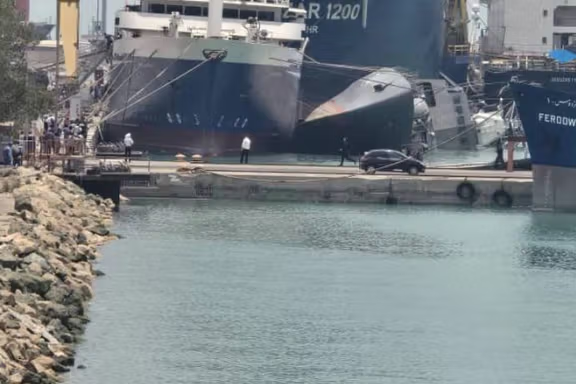
Iran's Sahand warship finally sank on Tuesday after damage inflicted on the frigate on Sunday sparked speculation of a cyberattack.

Iran's Sahand warship finally sank on Tuesday after damage inflicted on the frigate on Sunday sparked speculation of a cyberattack.
The vessel had been briefly repositioned following its initial capsizing in Bandar Abbas but the damage was too great to reverse on the warship equipped with surface-to-surface and surface-to-air missiles, anti-aircraft batteries and sophisticated radar and radar-evading capabilities.
"The Sahand warship, which was rebalanced on the water with great difficulty on Monday, has now sunk after the rope holding the ship broke," reported Nournews, a news agency linked to the Supreme National Security Council.
On Sunday, the official news agency IRNA, announced that the ship "lost its balance due to water ingress". Downplaying the damage, it was hasty in adding that "the vessel is being returned to balance quickly".
Security analysts suggested it could be the work of an Israeli cyberattack amid the ongoing shadow war between the two archenemies.
In 2020, a suspected Israeli hack at Shahid Rajaee port caused days of disruptions and damage, allegedly in retaliation for an attempted Iranian cyber attack on Israel's ports.
Ronen Solomon, an Israeli security analyst, told The Telegraph the incident had “all the elements that could point to a sophisticated operation with a space of denial that suits both sides, Israel and Iran”.
It is the latest mishap to tarnish the Navy's fleet. In January 2018, a naval destroyer, Damavand, sank in the Caspian Sea after crashing into a breakwater and in June 2021 Iran’s largest navy ship at the time, the Kharg, sank after catching fire in the Gulf of Oman.
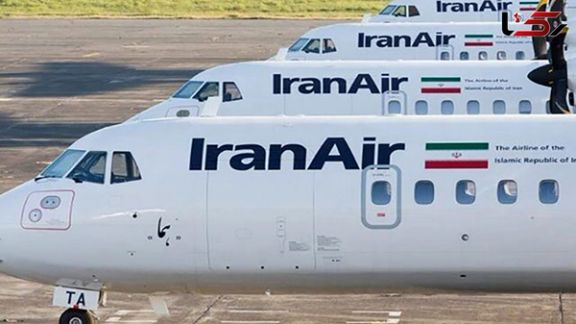
Iran’s deputy minister of roads and urban development has criticized whispers of regulating prices for airlines, stating that running an airline under such restrictions is impossible.
The comment highlights the ongoing tension between the government and the aviation industry over ticket pricing.
Mohammad Mohammadi-Bakhsh said that the High Council of Aviation should set prices, a practice that has been in place for many years. However, with current whispers of price liberalization, there is concern about significant increases in flight prices.
Despite the government's attempts to prevent price hikes, airline companies, burdened by rising operational costs, oppose the move.
The head of the Civil Aviation Organization on Tuesday also claimed the arrival of 100 airplanes and helicopters over the past 33 months, with 55 put into operation.
“Currently, 270 ultralight aircraft and helicopters are operating in the country's aviation fleet. We need 550 aircraft."
It comes as Iran recently purchased a 29-year-old plane from the Taliban, highlighting the government's desperate measures amid global sanctions which continues to tie Iran's hands. Critics slam the Raisi administration's claims of fleet expansion, noting many supposed new additions are merely old planes repaired in Iran.
The purchase follows Airbus's cancellation of a major deal to sell Iran 100 planes, worth $30 billion, due to the Trump administration's withdrawal from the JCPOA and reimposition of sanctions. Since the 1990s, Iran has struggled to buy new aircraft or spare parts due to sanctions, leading to a steadily deteriorating fleet.
As a result, Iran's aviation fleet has become increasingly old and unreliable, with an average age of over 25 years and many planes in dire need of major repairs. The government's failure to secure modern aircraft continues to compromise the safety and reliability of air travel in the country.
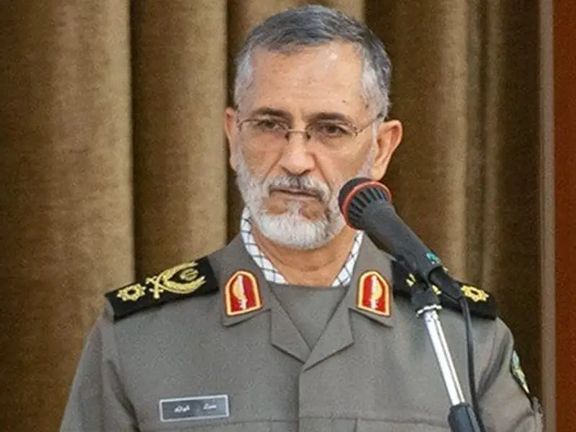
Mohammad Shirazi, the head of Ali Khamenei's military office, lauded Iran's military capabilities, particularly highlighting the recent attack on Israel.
The Supreme Leader's military chief said that Iran is "at a point where we can confidently carry out similar operations and showcase our capabilities to the world," referring to the aerial assault on Israel in April when a barrage of 350 drones, rockets and missiles was sent towards Iran's archenemy.
Around 99 percent of the barrage was intercepted by Israel and a US-led coalition, though it continues to be a point of pride for Iran.
Shirazi further boasted, "We have reached a stage where major powers are extending their hands to us to meet their needs." While he did not specify which major powers he was referring to, his comments allude to Iran’s provision of drones to Russia in its ongoing war against Ukraine, as well as reports of supplying ballistic missiles.
Iran continues to back Yemen's Houthis which are currently blockading the Red Sea region and attacking commercial shipping, in allegiance with Iran-backed Hamas in Gaza. They say the blockade aims to force Israel into a ceasefire amid the longest Gaza war in history.
Meanwhile, Iran's largest proxy, Hezbollah in Lebanon, continues to attack Israel in support of Hamas. Iran's proxies in Syria and Iraq have also send projectiles towards the Jewish state in addition to targeting US facilities and personal in the region following its support of Israel's right to defend itself after Hamas's October 7 attack on Israel.
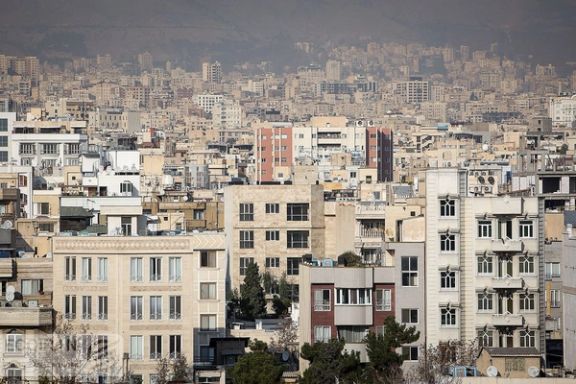
Ordinary Iranians are now facing a century-long wait to own a home amid skyrocketing prices as the average price in the capital reached about 860 million rials per square meter (approximately $1475) in June.
With working class Iranians making around $200 per month, local media estimate that it would take more than a century or longer for a wage earner to afford to buy the smallest residential unit.
Etemad newspaper wrote that based on the latest official statistics published by the Central Bank this figure has increased by more than 40 million rials per square meter (about $68) in the past two months.
The Central Bank report highlights that in June, a large portion of the housing demand has shifted towards areas with old and dilapidated structures. The developers have undertaken extensive construction in these areas, and now newly built "small-sized" houses have been able to attract some of the demand in the busiest areas of Tehran.
This trend also underscores the measures Iranians are taking to safeguard their savings against runaway inflation as real estate in Iran is a major hedge against inflation to protect savings.
While annual inflation hovers around 50%, the minimum wage for the current year has been set at 110 million rials (about $190), making it nearly impossible for many to make ends meet.
With such an income, the prospect of owning a home has become an impossible dream for many. Majid Goudarzi, a housing expert, told Tejarat News in February that “the waiting period for owning a home has now exceeded a hundred years.”
Etemad newspaper also cited a report by the Parliament Research Center in May, stating that the waiting time for the first decile of society to own a home has exceeded 123 years. This statistic highlights the housing crisis exacerbated by the government's economic mismanagement, leaving ordinary Iranians struggling to protect their savings and secure basic necessities.
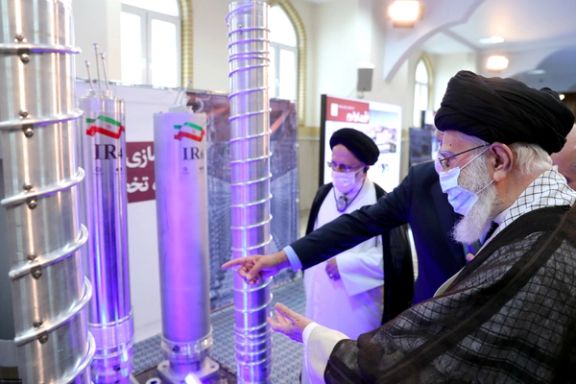
With a new president nearly in office in Tehran, there is much speculation about the direction of the new Iranian government's foreign policy.
Supreme Leader Ali Khamenei, who is widely believed to have the final say on foreign policy and other matters in Iran, has assured domestic and foreign audiences that no change is likely to take place in Iran's foreign policy with the change of president. However, the specter of Trump’s re-election is not a pleasant prospect for Khamenei and the veneer of a more “moderate” government might be one of the few effective tools he can employ to deflect more sanctions and pressures.
Nonetheless, to respond to the demands of the nation whose patience is running thin in the face of serious and long-standing economic problems, the new president has vowed to do whatever in his power to improve the country's relations with the outside world in a bid to have the paralyzing US and other international sanctions on Iran lifted.
The most severe sanctions on Iran were imposed following the 2018 US withdrawal from the JCPOA nuclear deal. These sanctions have significantly impacted Iran's oil sales and international banking. As a result, Tehran's ability to sell oil on international markets has been restricted, and it faces challenges in repatriating the proceeds, having to sell the oil at discounted prices almost exclusively to China.
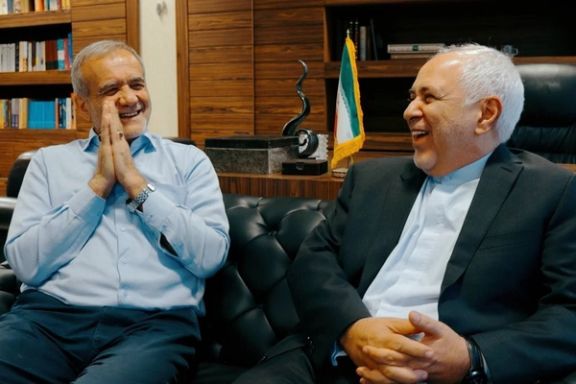
It remains unclear who will be the country's new foreign minister. Traditionally, however, Iran’s so-called moderate governments have relied on disagreements between the United States and Europe, leveraging divisions to weaken a united front against the Islamic Republic’s nuclear program and its regional interventions.
Some of the latest reports from Tehran indicate that the new government is keen to follow an approach of less tensions with West. For instance, a report in proreform Fararu website says that Iran's new government, which has not been officially formed yet, is likely to review the country's domestic and foreign policies.
However, this does not seem to be so easy, as the new President Masoud Pezeshkian's fundamentalist rival Saeed Jalili has threatened that “revolutionary forces” will not allow the government to make any compromise on ideological values.
Fararu reminded that hardliners who oppose better ties with the West have lost the election, but they have not lost political power. This serious challenge, according to the website will affect every decision to be made by the new government.
The new government will inevitably face several challenges, including securing approval for its cabinet ministers from the hardliner-dominated parliament. Some observers note that Pezeshkian has friendly ties with Majles Speaker Mohammad Bagher Ghalibaf. However, the key question is whether Ghalibaf can influence the hardliners in parliament. The answer to this will determine how easy or difficult it will be for Pezeshkian's cabinet ministers to win a vote of confidence from the Majles.
Putting foreign policy on the right track is the next challenge. The unknown factor is Supreme Leader Ali Khamenei’s plan. Does he want a meaningful change or just a façade of a “reformist” government? Then comes Pezeshkian’s task of dealing with hardliners if he ends up trying to make any concessions to the United States.
The next challenge will be striking a balance between relations with and dependency on the East and the West. Radicals in Iran refuse to accept that even China and Russia must engage with the United States and Europe as both trade partners and political rivals. People like Jalili have often been more anti-West than even Russia and China.
Leaving behind these challenges is not easy considering the weight and might of hardliners' media fleet led by the state radio and television and the backing of the Revolutionary Guard.
However, Pezeshkian may have a counterbalance that could silence the hardliners: potential support from Khamenei. Iranians will see within a few months if this backing materializes. Even if it does, Pezeshkian might abandon his promise to end the crackdown on women who defy the compulsory hijab. This is an area where Khamenei is likely to allow the radicals free rein, assuring them that they are not entirely marginalized.
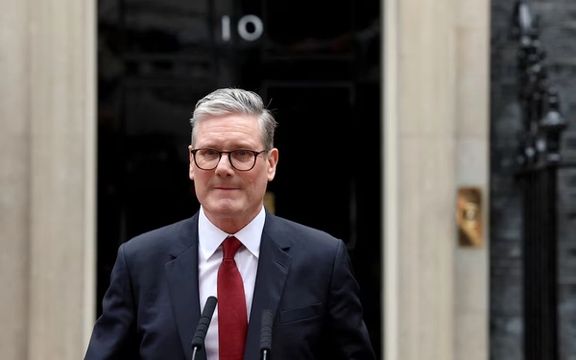
US President Joe Biden will host Britain's new Prime Minister, Keir Starmer, at the White House on Wednesday, focusing on countering Iran's escalating global threats.
Key issues on the agenda include the conflicts in Ukraine and the Israel-Gaza war, with a critical focus on Iran's nuclear ambitions and destabilizing activities. Tehran's clandestine actions and refusal to fully cooperate with the International Atomic Energy Agency (IAEA) have fueled suspicions of its intent to develop nuclear weapons, potentially sparking a regional arms race.
Additionally, Iran's Houthi rebels in Yemen continues to attack commercial shipping in the Red Sea region and Saudi Arabian oil infrastructure, threatening global energy supplies and trade routes.
With the victory of Labor party in the UK, its politicians have called for tough action against the Islamic Revolutionary Guard Corps (IRGC), including its proscription. The cross-party interest in Iran over the past two years across both Houses of Parliament has been unprecedented.
Recently, over 500 MPs and Lords urged the government to proscribe the IRGC. The Labor manifesto highlights "assassination plots by the IRGC" as part of rising threats in the UK from hostile states, pledging to adapt counter-terrorism measures for state-based threats.
This includes assassination and kidnap attempts on Iran International staff, with the UK's intelligence agency, MI5, calling Iran one of the country's biggest foreign threats on its soil.
Both the new Home Secretary and Foreign Secretary previously urged amendments to the UK’s Terrorism Act 2000 to cover hostile state actors offering hope of proscription under the new government.